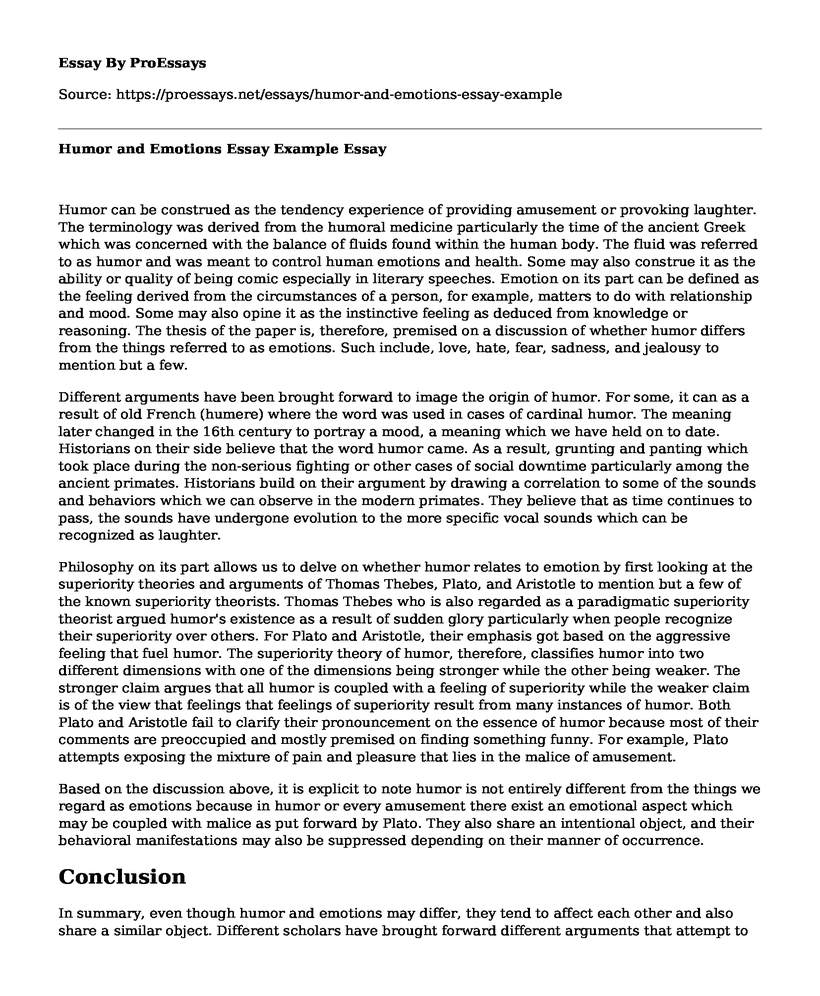Humor can be construed as the tendency experience of providing amusement or provoking laughter. The terminology was derived from the humoral medicine particularly the time of the ancient Greek which was concerned with the balance of fluids found within the human body. The fluid was referred to as humor and was meant to control human emotions and health. Some may also construe it as the ability or quality of being comic especially in literary speeches. Emotion on its part can be defined as the feeling derived from the circumstances of a person, for example, matters to do with relationship and mood. Some may also opine it as the instinctive feeling as deduced from knowledge or reasoning. The thesis of the paper is, therefore, premised on a discussion of whether humor differs from the things referred to as emotions. Such include, love, hate, fear, sadness, and jealousy to mention but a few.
Different arguments have been brought forward to image the origin of humor. For some, it can as a result of old French (humere) where the word was used in cases of cardinal humor. The meaning later changed in the 16th century to portray a mood, a meaning which we have held on to date. Historians on their side believe that the word humor came. As a result, grunting and panting which took place during the non-serious fighting or other cases of social downtime particularly among the ancient primates. Historians build on their argument by drawing a correlation to some of the sounds and behaviors which we can observe in the modern primates. They believe that as time continues to pass, the sounds have undergone evolution to the more specific vocal sounds which can be recognized as laughter.
Philosophy on its part allows us to delve on whether humor relates to emotion by first looking at the superiority theories and arguments of Thomas Thebes, Plato, and Aristotle to mention but a few of the known superiority theorists. Thomas Thebes who is also regarded as a paradigmatic superiority theorist argued humor's existence as a result of sudden glory particularly when people recognize their superiority over others. For Plato and Aristotle, their emphasis got based on the aggressive feeling that fuel humor. The superiority theory of humor, therefore, classifies humor into two different dimensions with one of the dimensions being stronger while the other being weaker. The stronger claim argues that all humor is coupled with a feeling of superiority while the weaker claim is of the view that feelings that feelings of superiority result from many instances of humor. Both Plato and Aristotle fail to clarify their pronouncement on the essence of humor because most of their comments are preoccupied and mostly premised on finding something funny. For example, Plato attempts exposing the mixture of pain and pleasure that lies in the malice of amusement.
Based on the discussion above, it is explicit to note humor is not entirely different from the things we regard as emotions because in humor or every amusement there exist an emotional aspect which may be coupled with malice as put forward by Plato. They also share an intentional object, and their behavioral manifestations may also be suppressed depending on their manner of occurrence.
Conclusion
In summary, even though humor and emotions may differ, they tend to affect each other and also share a similar object. Different scholars have brought forward different arguments that attempt to explain the origin of humor with some being of the view that it originated from the Old French while others view it from the evolution of primates. The paper has, however, considered the different opinions while also bringing into picture different philosophical argument and imaging the conclusion of the existence of a notable correlation between humor and emotions.
Cite this page
Humor and Emotions Essay Example. (2022, Nov 20). Retrieved from https://proessays.net/essays/humor-and-emotions-essay-example
If you are the original author of this essay and no longer wish to have it published on the ProEssays website, please click below to request its removal:
- Adoption of Behavioral Therapies in ADHD Treatment Instead Medication
- Effects of Trauma on Children Essay
- Ethical Issues in Physician-Assisted Suicide Essay
- Dissociative Identity Disorder (DID) Essay Example
- The Ethics of Leadership Essay Example
- The Jealousy Effect of Emoticons on Social Media - Essay Sample
- Research Paper on Autism: Prejudice & Intolerance Must be Overcome







